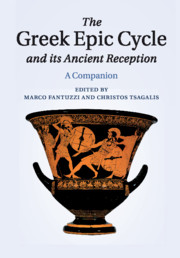Book contents
- Frontmatter
- Contents
- List of illustrations
- List of contributors
- Editorial note
- Introduction: Kyklos, the Epic Cycle and Cyclic poetry
- PART I APPROACHES TO THE EPIC CYCLE
- PART II EPICS
- PART III THE FORTUNE OF THE EPIC CYCLE IN THE ANCIENT WORLD
- Works cited
- Index of principal passages
- Index nominum et rerum
Introduction: Kyklos, the Epic Cycle and Cyclic poetry
Published online by Cambridge University Press: 05 August 2015
- Frontmatter
- Contents
- List of illustrations
- List of contributors
- Editorial note
- Introduction: Kyklos, the Epic Cycle and Cyclic poetry
- PART I APPROACHES TO THE EPIC CYCLE
- PART II EPICS
- PART III THE FORTUNE OF THE EPIC CYCLE IN THE ANCIENT WORLD
- Works cited
- Index of principal passages
- Index nominum et rerum
Summary
Kyklos: tracing a metaphor
The term kyklos is notorious for its ambiguity. The word encompasses various interpretations, most of them metaphorical: apart from the proper sense ‘circle’, it can designate any circular body like a wheel, a trencher, a place of an assembly or the people standing in a ring, the vault of the sky, the orb or disk of a celestial body, the wall around a city, a round shield, the eyeballs, an olive wreath, a collection of legends or poems, a circular dance, a rounded period, a globe, a kind of anapaest, the ring composition. Whatever sense one adopts, it can be generally agreed upon that the meaning of kyklos as a ‘cycle’ of epic poems must be metaphorical.
We will now offer a synopsis of five possible interpretations of the term kyklos with respect to the Epic Cycle. In particular, the word kyklos has been employed so as to denote: (a) an idea of uniformity and continuity; (b) a notion of ‘ring form’; (c) the concept of completeness; (d) an encircling or framing function; and (e) a poetics based on manufacturing a perfected whole.
(a) The notion of uniformity and continuity is inherent in an emblematic passage from Photius' Bibliotheca (319a30), which quotes Proclus – but Proclus may have reflected an older introductory justification to a compilation of summaries of the Cyclic poems that possibly were Proclus' source:1 λέγει [scil. ὁ Πρόκλος] δὲ ὡς τοῦ ἐπικοῦ κύκλου τὰ ποιήματα διασώιζεται καὶ σπουδάζεται τοῖς πολλοῖς οὐχ οὕτωι διὰ τὴν ἀρετὴν ὡς διὰ τὴν ἀκολουθίαν τῶν ἐν αὐτῶι πραγμάτων (‘Proclus says that the poems of the Epic Cycle are preserved and paid attention to not so much for their value as for the orderly sequence of the events narrated in it’).
This passage makes clear that down to Proclus' day the epic cycle was studied for its narrative linearity, i.e. because it offered a sequential presentation of mythical events stretching from the ‘love mixing’ of Ouranos and Gaia to Odysseus' death and the end of the race of heroes. This narrative concatenation must have created a notion of uniformity that surpassed the individuality of the various epic poems from which the Epic Cycle was formed, and offered the readers a convenient, continuous and linear storyline.
- Type
- Chapter
- Information
- The Greek Epic Cycle and its Ancient ReceptionA Companion, pp. 1 - 40Publisher: Cambridge University PressPrint publication year: 2015
- 25
- Cited by



